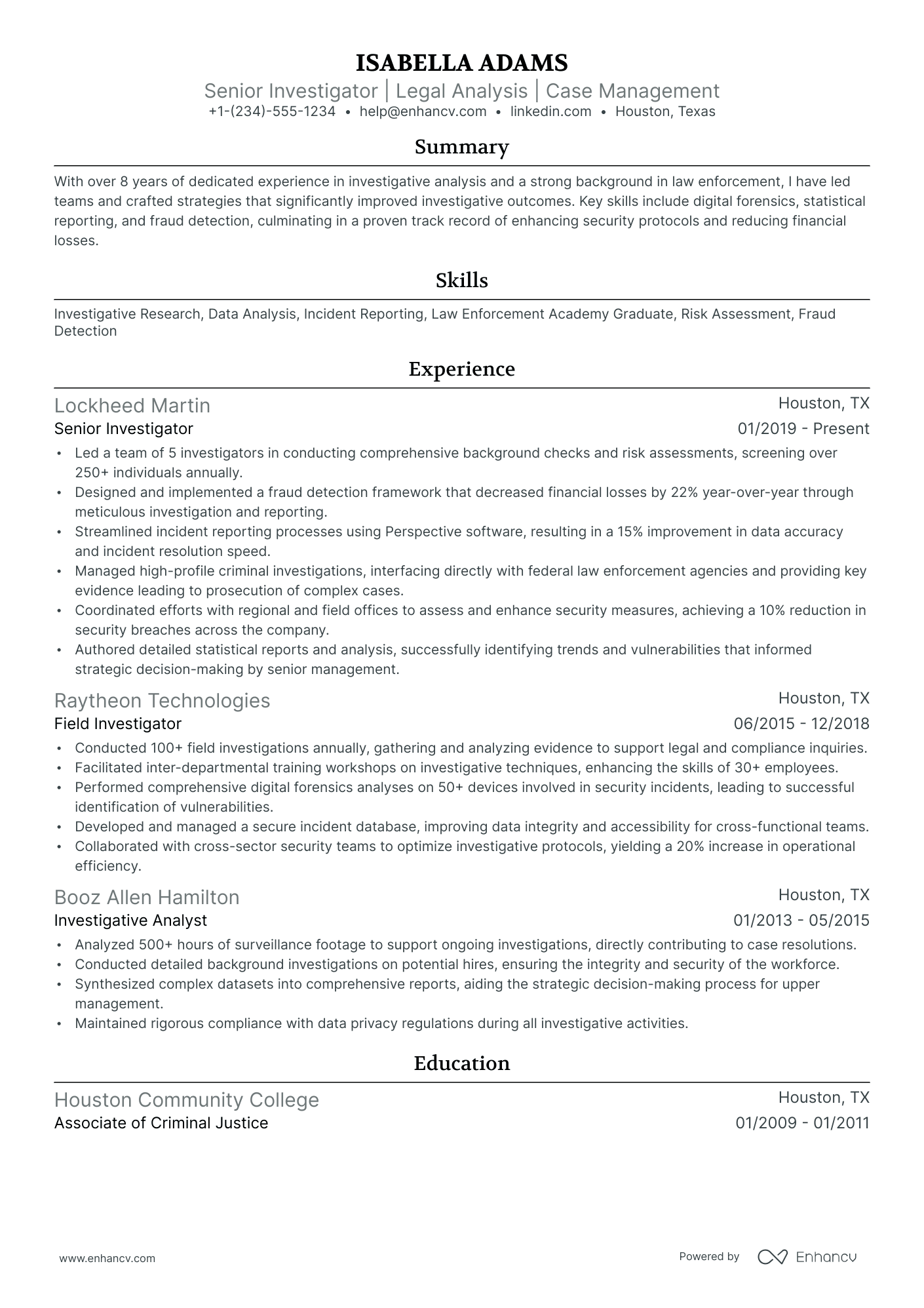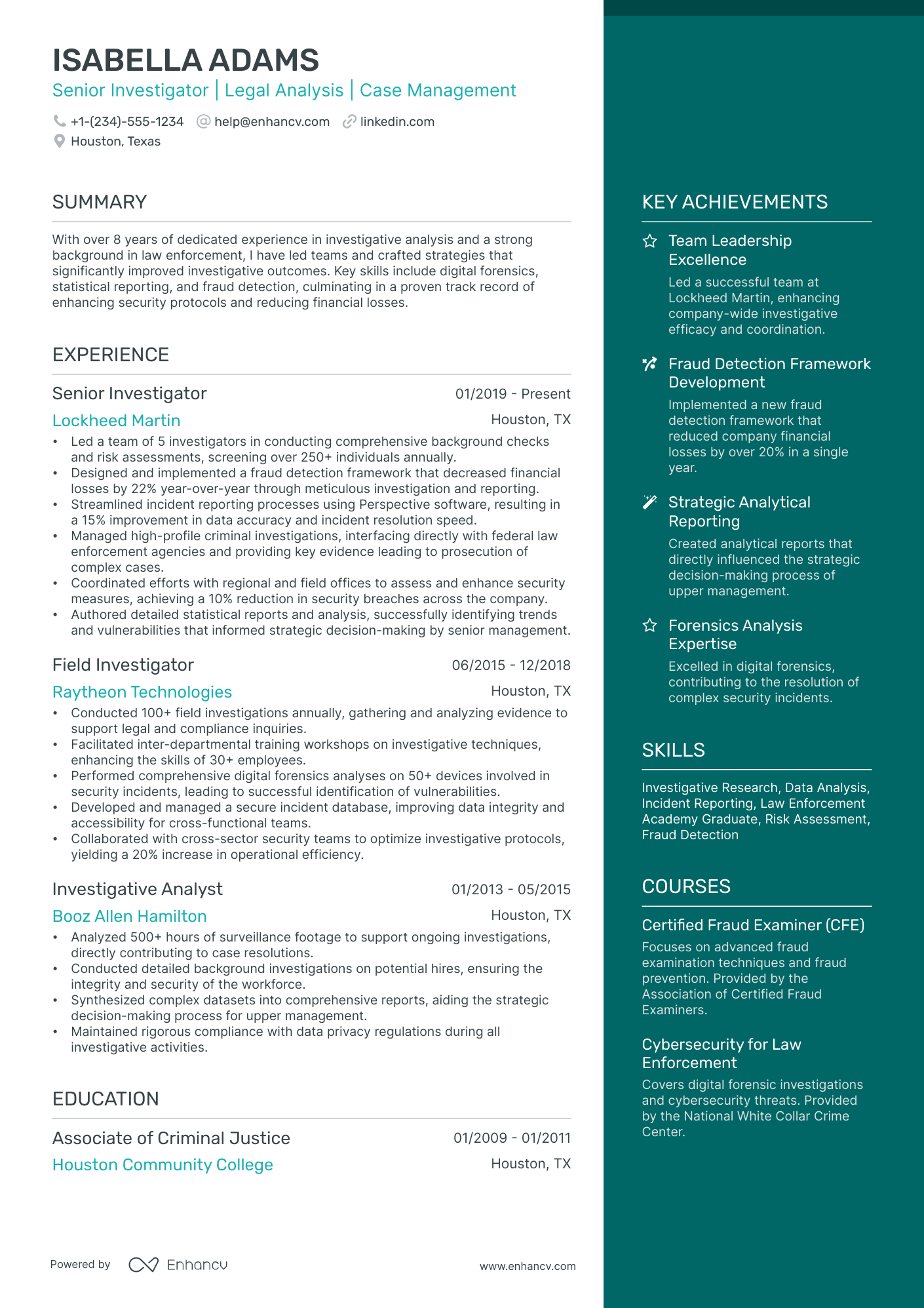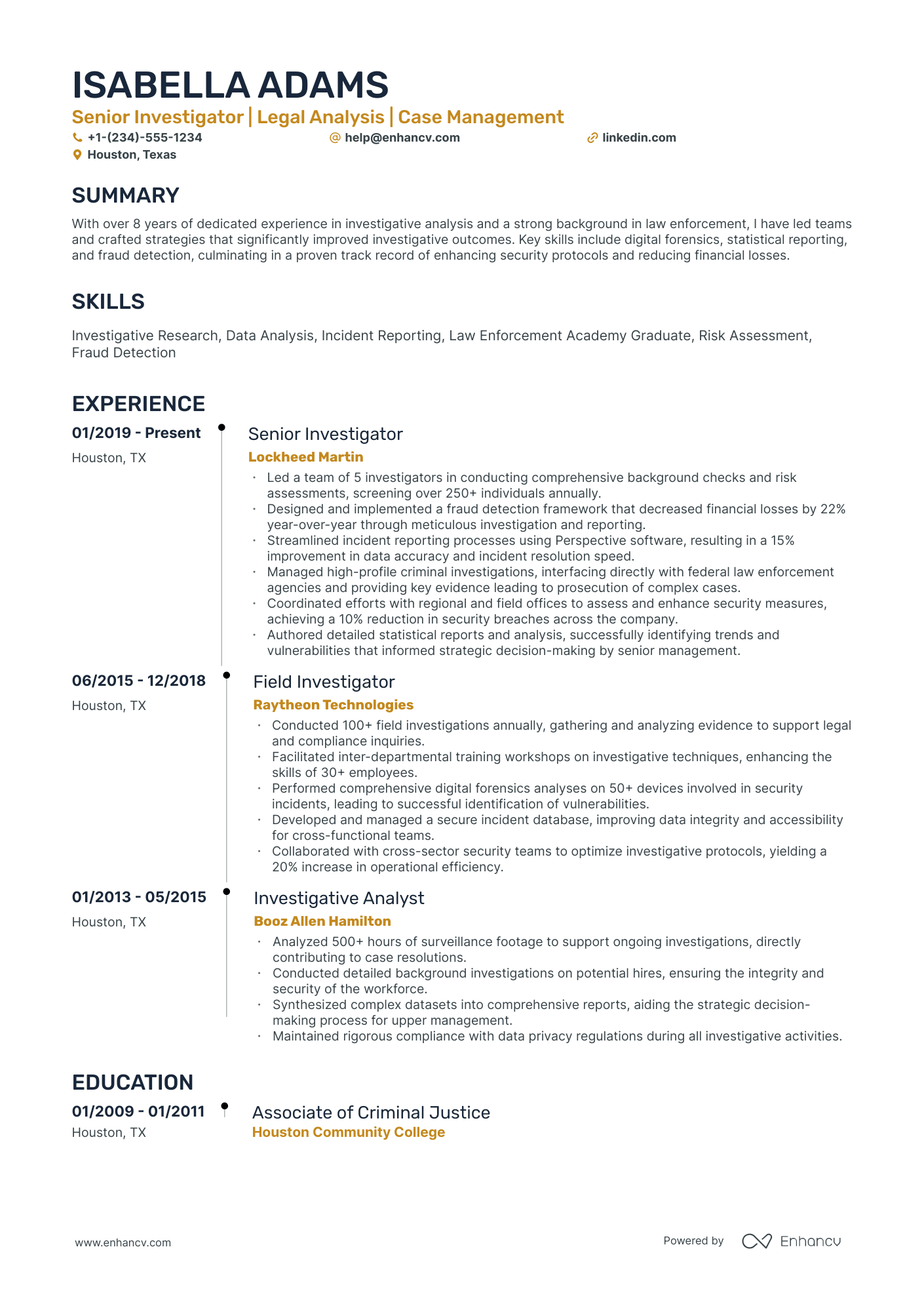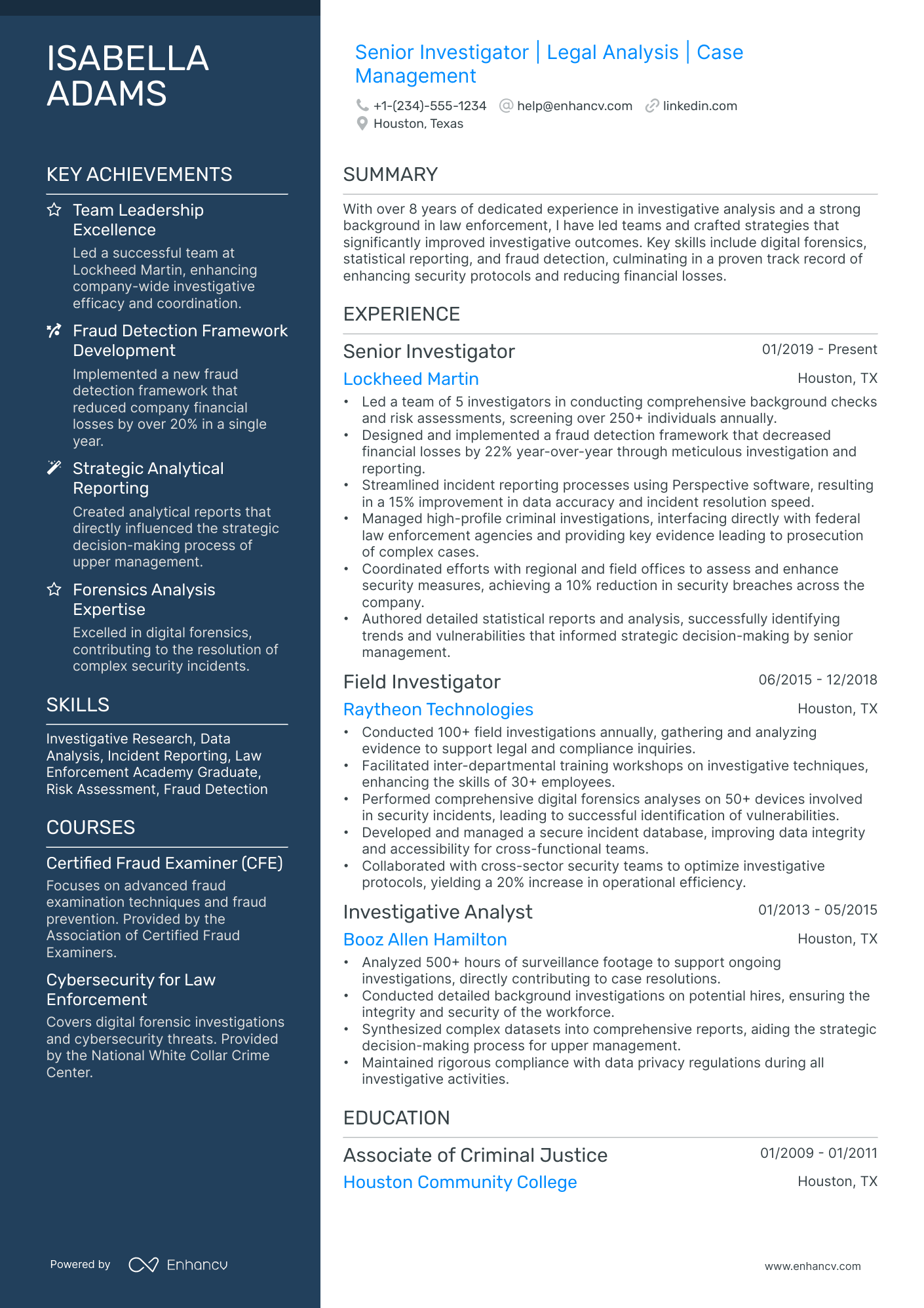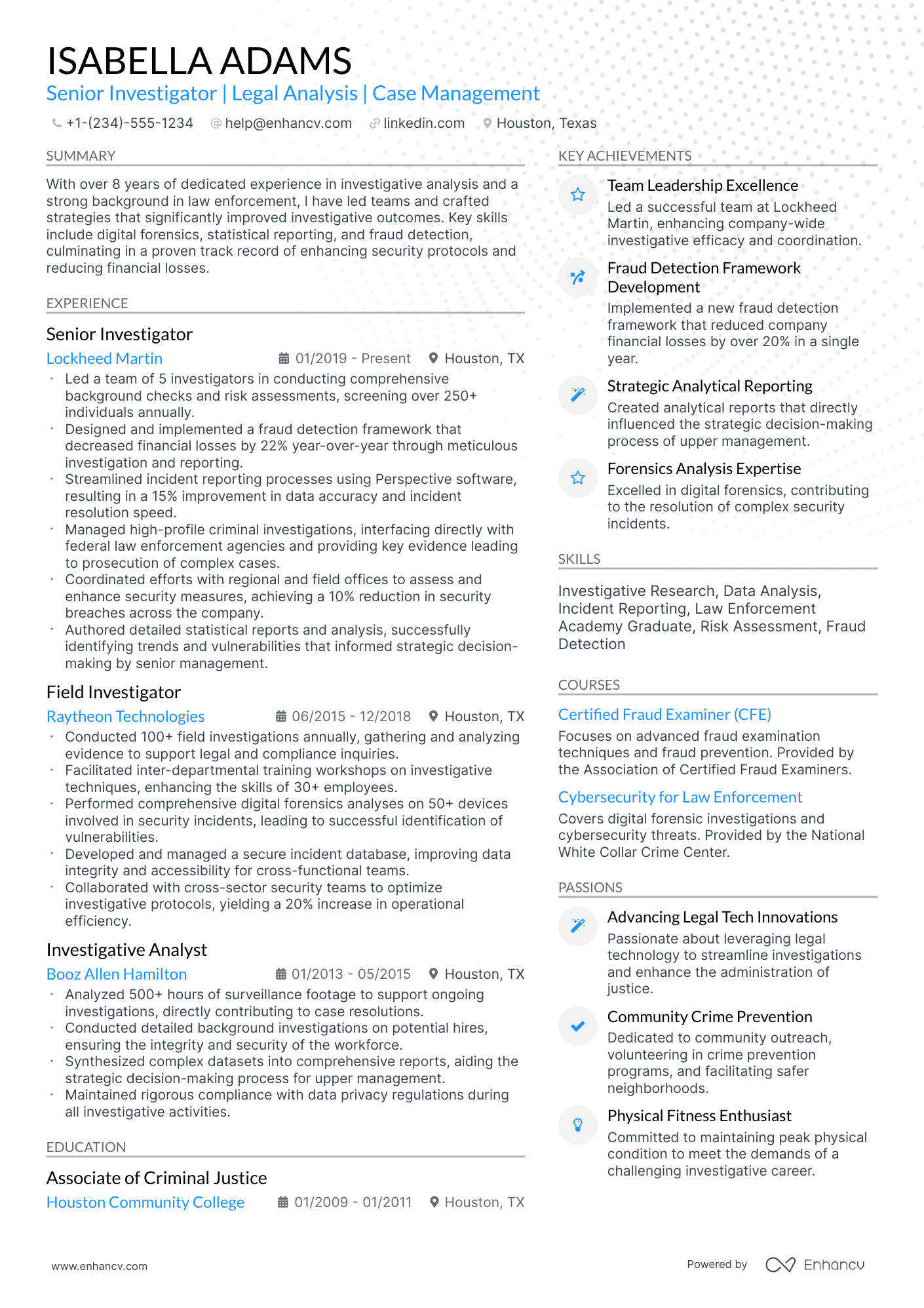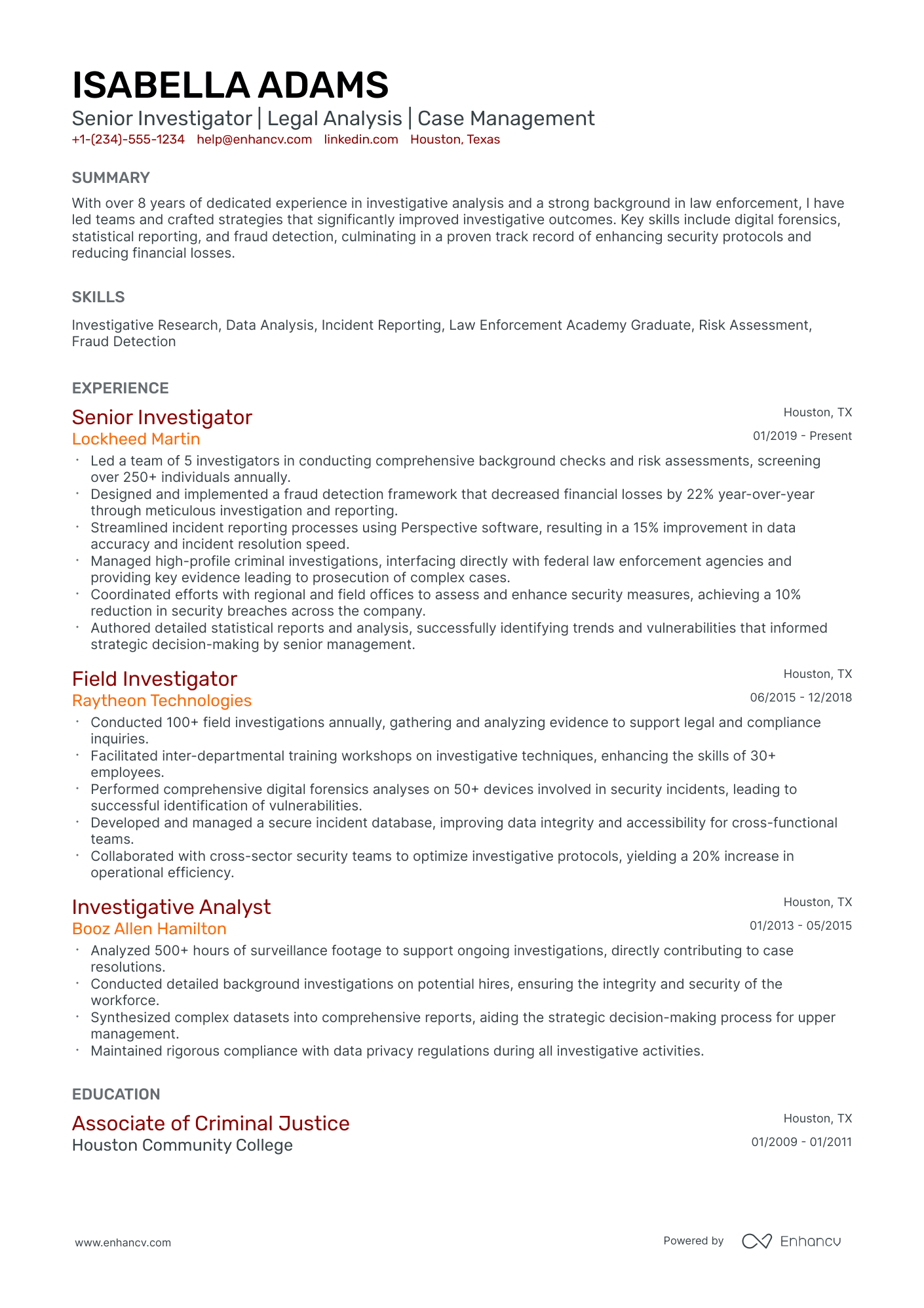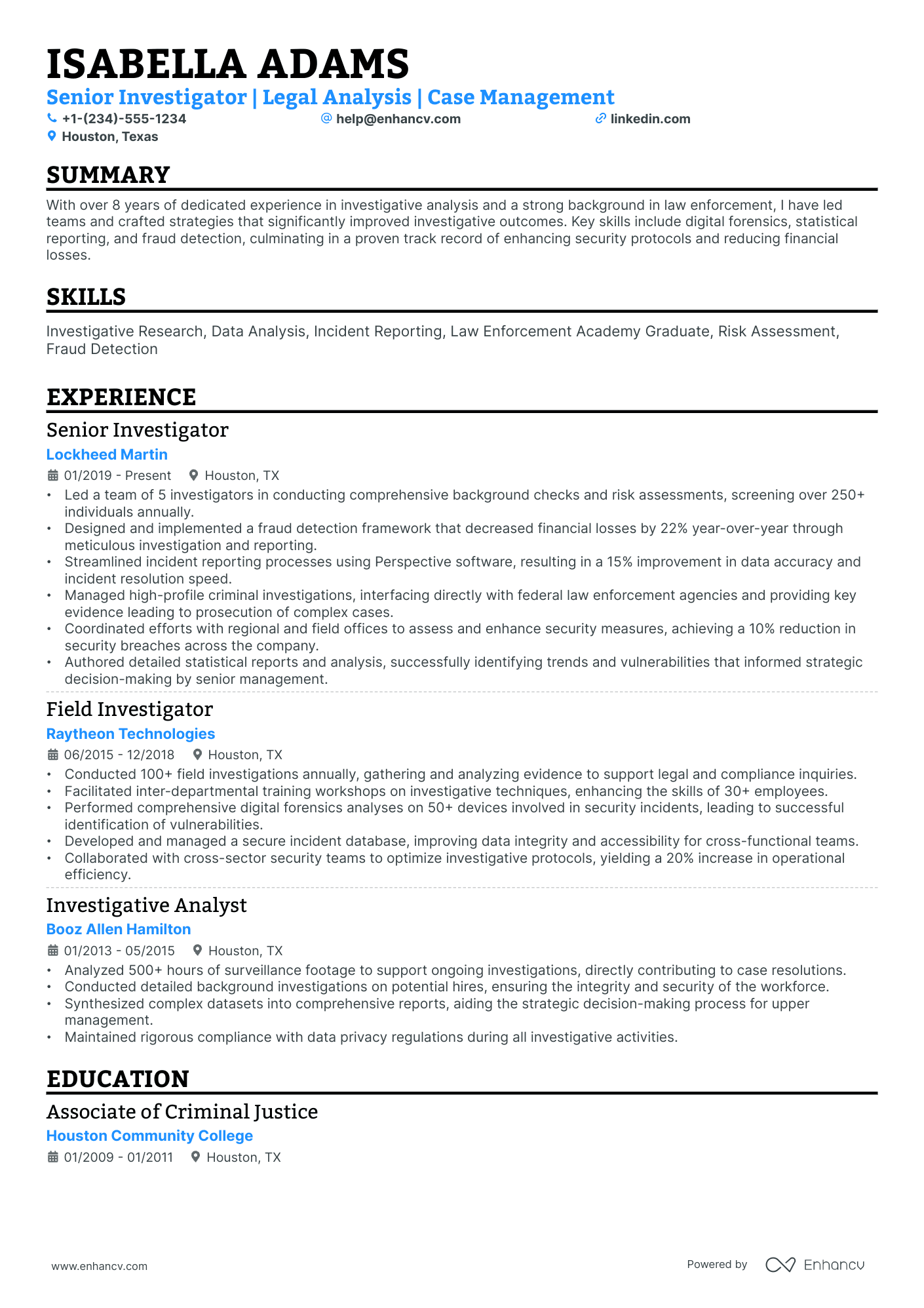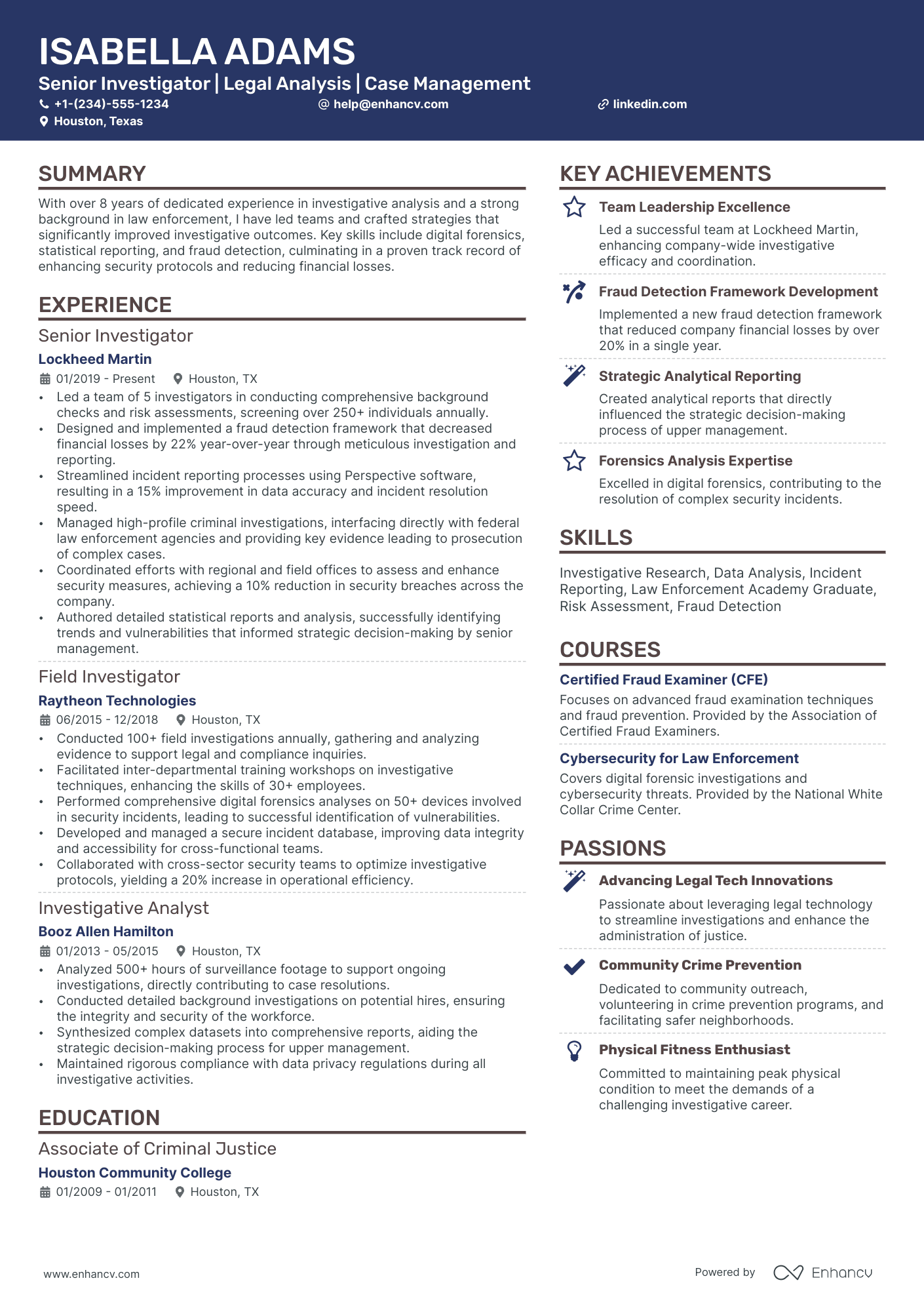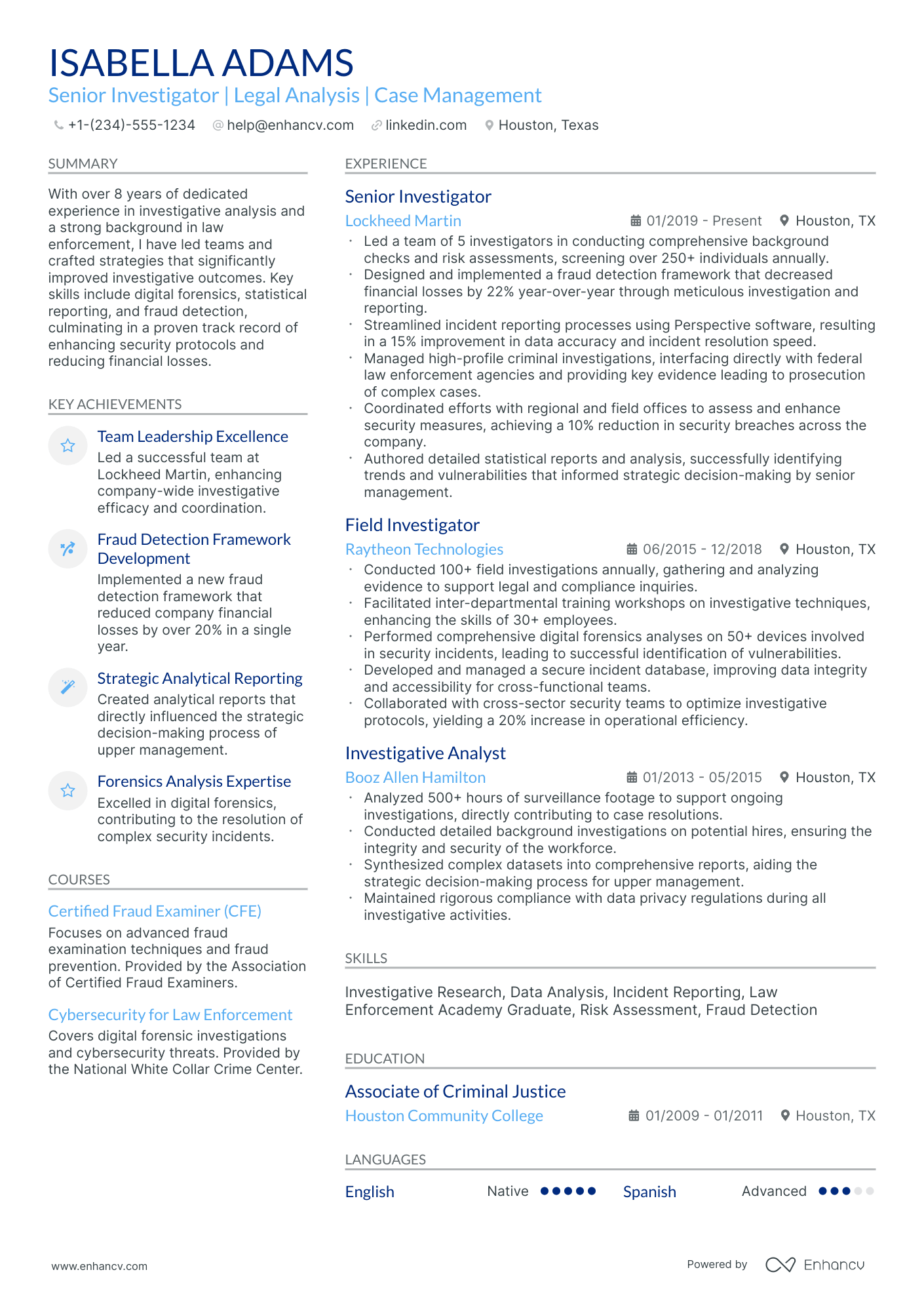Most investigator resume drafts fail because they read like case logs, not hiring documents. Dense narratives hide results, so an ATS and a recruiter's quick scan can't confirm impact fast.
A strong resume shows what you changed and how you proved it. Knowing how to make your resume stand out starts with highlighting case closure rates, dollar value recovered, cycle time reduced, audit findings cleared, subpoenas executed, and reports adopted by counsel.
Key takeaways
- Quantify case outcomes—closure rates, dollars recovered, cycle time reduced—instead of listing daily tasks.
- Use reverse-chronological format for experienced investigators and hybrid format for career changers.
- Tailor every experience bullet to the specific job posting's tools, frameworks, and compliance standards.
- Dedicate roughly two-thirds of your skills section to hard skills and one-third to soft skills.
- Demonstrate skills inside experience bullets and your summary, not only in a standalone list.
- Pair your resume with a cover letter when the role is competitive or your background needs context.
- Use Enhancv to turn routine investigative tasks into measurable, recruiter-ready resume bullets faster.
Job market snapshot for investigators
We analyzed 3,159 recent investigator job ads across major US job boards. These numbers help you understand employer expectations, experience requirements, employment type trends at a glance.
What level of experience employers are looking for investigators
| Years of Experience | Percentage found in job ads |
|---|---|
| 1–2 years | 18.5% (583) |
| 3–4 years | 5.2% (165) |
| 5–6 years | 4.3% (136) |
| 7–8 years | 1.2% (39) |
| 9–10 years | 0.5% (15) |
| 10+ years | 2.1% (65) |
| Not specified | 68.4% (2162) |
Investigator ads by area of specialization (industry)
| Industry (Area) | Percentage found in job ads |
|---|---|
| Government | 50.5% (1594) |
| Finance & Banking | 31.9% (1008) |
| Healthcare | 10.9% (344) |
| Education | 3.3% (105) |
| Retail & E-commerce | 1.3% (42) |
| Professional Services | 0.8% (24) |
| Media & Entertainment | 0.4% (12) |
| Nonprofit | 0.3% (11) |
Top companies hiring investigators
| Company | Percentage found in job ads |
|---|---|
| State of Florida | 14.5% (459) |
| Department Of Justice | 10.8% (341) |
| Allied Universal Security | 8.0% (254) |
| Department Of Homeland Security | 8.0% (254) |
| State of Oklahoma | 2.7% (84) |
| Texas Health & Human Services Commission | 2.2% (70) |
| TD Bank | 1.8% (58) |
| Capital One | 1.7% (54) |
| State of Virginia | 1.7% (54) |
| State of California | 1.6% (50) |
Role overview stats
These tables show the most common responsibilities and employment types for investigator roles. Use them to align your resume with what employers expect and to understand how the role is structured across the market.
Day-to-day activities and top responsibilities for a investigator
| Responsibility | Percentage found in job ads |
|---|---|
| Data analysis | 19.9% (629) |
| Report writing | 11.6% (367) |
| Microsoft word | 10.7% (337) |
| Microsoft office | 7.9% (250) |
| Research | 7.9% (249) |
| Maps | 6.6% (209) |
| Charts | 6.6% (208) |
| Crime analysis | 6.6% (208) |
| Infographics | 6.6% (208) |
| Matrices | 6.6% (208) |
| Tables | 6.6% (208) |
| Law enforcement indices | 6.6% (207) |
Type of employment (remote vs on-site vs hybrid)
| Employment type | Percentage found in job ads |
|---|---|
| On-site | 80.6% (2546) |
| Hybrid | 13.9% (440) |
| Remote | 5.5% (173) |
How to format a investigator resume
Recruiters reviewing investigator resumes prioritize analytical rigor, attention to detail, case management experience, and the ability to synthesize evidence into actionable findings. A clean, well-structured resume format ensures these signals surface quickly during both automated screening and manual review, preventing critical qualifications from getting buried.
I have significant experience in this role—which format should I use?
Use a reverse-chronological format to highlight your depth of investigative experience and growing case complexity over time. Do:
- Lead with your most recent role and emphasize scope of caseload, jurisdictional reach, and ownership of investigations from intake through resolution.
- Feature role-specific proficiencies such as fraud examination, digital forensics tools, surveillance techniques, regulatory compliance frameworks, or interview and interrogation methodologies.
- Quantify outcomes wherever possible—case clearance rates, financial recoveries, reduced investigation timelines, or successful prosecutions supported.
I'm junior or switching into this role—what format works best?
A hybrid format works best because it lets you lead with transferable investigative skills while still showing a clear work history. Do:
- Place a dedicated skills section near the top featuring competencies like evidence collection, report writing, data analysis, background screening, or compliance auditing.
- Highlight relevant projects, internships, academic research, or volunteer work that involved investigation-adjacent tasks such as fact-finding, interviewing, or case documentation.
- Connect each skill or experience to a concrete action and measurable result so hiring managers can assess your real-world impact.
Why not use a functional resume?
A functional resume strips away the timeline and context that hiring managers need to evaluate how your investigative skills were applied in real situations, making it harder to verify your credibility and track record. A functional format may be acceptable if you're transitioning from a related field (such as law enforcement, compliance, or journalism), have a gap in employment, or lack formal investigative titles but have performed substantial case-based work—provided you still tie every listed skill to a specific project, case, or outcome rather than presenting skills in isolation.
With your format established, the next step is filling it with the right sections to showcase your qualifications effectively.
What sections should go on a investigator resume
Recruiters expect to see a clear record of investigative work, case outcomes, and compliance with legal and ethical standards on your investigator resume. Understanding which resume sections to include ensures you present a complete picture of your qualifications.
Use this structure for maximum clarity:
- Header
- Summary
- Experience
- Skills
- Projects
- Education
- Certifications
- Optional sections: Awards, Publications, Languages
Strong experience bullets should emphasize case impact, measurable outcomes, scope of investigations, and defensible results.
Is your resume good enough?
Drop your resume here or choose a file. PDF & DOCX only. Max 2MB file size.
With the resume’s key components in place, the next step is to write your investigator resume experience section so you can present your work history within that structure.
How to write your investigator resume experience
The experience section is where you prove your investigative skills through real casework you've completed, the methodologies and tools you applied, and the measurable outcomes your work produced. Hiring managers prioritize demonstrated impact—cases resolved, fraud uncovered, risks mitigated—over descriptive task lists that simply restate a job description.
Each entry should include:
- Job title
- Company and location (or remote)
- Dates of employment (month and year)
Three to five concise bullet points showing what you owned, how you executed, and what outcomes you delivered:
- Ownership scope: the caseloads, investigative portfolios, jurisdictions, or compliance areas you were directly accountable for as an investigator.
- Execution approach: the investigative tools, databases, surveillance techniques, interview methods, or analytical frameworks you used to gather evidence and reach sound conclusions.
- Value improved: changes to case resolution quality, fraud detection accuracy, regulatory compliance rates, risk reduction, or evidence integrity resulting from your investigative work.
- Collaboration context: how you coordinated with law enforcement agencies, legal teams, compliance officers, internal stakeholders, or external regulatory bodies to advance or close investigations.
- Impact delivered: outcomes expressed through case resolutions, recoveries, policy changes, or organizational risk improvements rather than a simple list of daily investigative activities.
Experience bullet formula
A investigator experience example
✅ Right example - modern, quantified, specific.
Senior Corporate Investigator
Northbridge Payments | Austin, TX
2021–Present
Fintech payments company supporting over 2M customers with a high-volume fraud, disputes, and compliance program.
- Led complex fraud and insider-risk investigations using SQL, Splunk, and Salesforce Service Cloud; reduced average case cycle time from twelve to seven days (42%) while maintaining a 98% quality audit score.
- Built an evidence pipeline with Python and Tableau to correlate device fingerprinting, chargeback data, and transaction logs across 30M monthly events; increased confirmed fraud detection yield by 18% and prevented $2.4M in losses.
- Authored and executed investigation plans aligned to Bank Secrecy Act (BSA) and Anti-Money Laundering (AML) controls; improved suspicious activity report filing timeliness from 86% to 97% through standardized templates and peer review.
- Partnered with product managers, engineers, and legal to implement case management workflows and chain-of-custody standards; cut evidence retrieval time by 55% and reduced escalation rework by 23%.
- Interviewed complainants, employees, and third parties; documented findings in Confluence and Jira; supported HR and compliance decisions that lowered repeat policy violations by 15% quarter over quarter.
Now that you've seen how to structure your experience entries, let's focus on aligning them with the specific requirements of each job posting.
How to tailor your investigator resume experience
Recruiters evaluate your experience through applicant tracking systems and manual review, scoring how closely your background matches the posting. Tailoring your resume to the job description ensures your qualifications stand out during both screening stages.
Ways to tailor your investigator experience:
- Mirror the exact investigative methodologies and frameworks listed in the posting.
- Reference specific databases or surveillance tools the job description names.
- Match the compliance standards and regulatory requirements the employer prioritizes.
- Highlight case management systems or software platforms the role requires.
- Align your interview and interrogation techniques with those the posting describes.
- Incorporate the industry or domain focus stated in the job listing.
- Reflect the collaboration structures and reporting workflows the employer uses.
- Echo the performance benchmarks or case resolution criteria the role emphasizes.
Tailoring means aligning your real accomplishments with what the employer asks for, not forcing disconnected keywords into your experience section.
Resume tailoring examples for investigator
| Job description excerpt | Untailored | Tailored |
|---|
Once you’ve aligned your casework and responsibilities with the role’s priorities, the next step is to quantify your investigator achievements so hiring teams can see the scope and impact of your results.
How to quantify your investigator achievements
Quantifying your achievements proves outcomes, not effort. Focus on case volume, cycle time, accuracy, compliance, and risk reduction—plus dollar impact when you prevent fraud, recover losses, or avoid regulatory penalties.
Quantifying examples for investigator
| Metric | Example |
|---|---|
| Case throughput | "Closed 42 investigations per month on average across fraud and policy violations, using Salesforce and Excel trackers to prioritize high-risk queues." |
| Cycle time | "Cut average time to resolution from 12 days to seven by standardizing intake questions and building a triage checklist in Confluence." |
| Accuracy rate | "Improved substantiation accuracy from 88% to 95% after introducing a two-step evidence review and audit sampling in SharePoint." |
| Compliance risk | "Reduced overdue regulatory reports from nine per quarter to zero by creating a calendar-driven workflow and escalation rules in Outlook." |
| Loss prevention | "Prevented $310,000 in potential losses by identifying chargeback patterns and coordinating account holds with finance within 24 hours." |
Turn your everyday tasks into measurable, recruiter-ready resume bullets in seconds with Enhancv's Bullet Point Generator.
With strong bullet points in place, the next step is ensuring your investigator resume highlights the right mix of hard and soft skills to match what hiring managers are looking for.
How to list your hard and soft skills on a investigator resume
Your skills section shows you can gather evidence, analyze facts, and write defensible findings, and recruiters and ATS scan this section for role keywords, tools, and methods—aim for about two-thirds hard skills and one-third soft skills. investigator roles require a blend of:
- Product strategy and discovery skills.
- Data, analytics, and experimentation skills.
- Delivery, execution, and go-to-market discipline.
- Soft skills.
Your skills section should be:
- Scannable (bullet-style grouping).
- Relevant to the job post.
- Backed by proof in experience bullets.
- Updated with current tools.
Place your skills section:
- Above experience if you're junior or switching careers.
- Below experience if you're mid/senior with strong achievements.
Hard skills
- Case management systems
- Evidence collection and chain of custody
- Interview and interrogation techniques
- Surveillance planning and reporting
- Open-source intelligence (OSINT)
- Background checks and records searches
- Digital forensics triage
- eDiscovery platforms, legal holds
- Report writing and affidavit drafting
- Regulatory compliance investigations
- Fraud detection and loss prevention
- Excel, SQL, Tableau
Soft skills
- Ask precise, non-leading questions
- Document decisions and rationale
- Write clear, defensible narratives
- Deliver concise stakeholder updates
- Handle sensitive information discreetly
- Manage competing case priorities
- Escalate risk with clear options
- Coordinate with legal and HR
- Maintain objectivity under pressure
- De-escalate tense conversations
- Follow up until closure
- Present findings to leadership
How to show your investigator skills in context
Skills shouldn't live only in a bulleted list on your resume. Browse examples of resume skills presented in context to see how other professionals weave competencies into their experience and summary sections.
They should be demonstrated in:
- Your summary (high-level professional identity)
- Your experience (proof through outcomes)
Here's what that looks like in practice.
Summary example
Senior investigator with 12 years in corporate fraud detection. Skilled in forensic accounting, i2 Analyst's Notebook, and witness interviewing. Led a cross-departmental task force that reduced fraudulent claims by 34% within one fiscal year.
- Reflects senior-level experience clearly
- Names role-relevant tools and methods
- Includes a specific measurable outcome
- Highlights leadership as a soft skill
Experience example
Senior Fraud Investigator
Redline Compliance Group | Remote
March 2019–Present
- Investigated 200+ complex fraud cases using i2 Analyst's Notebook, recovering $4.1M in misappropriated funds over three years.
- Partnered with legal counsel and compliance teams to build evidentiary packages, achieving a 91% case resolution rate.
- Developed a standardized digital forensics workflow that cut average investigation timelines by 28% across the department.
- Every bullet contains measurable proof
- Skills appear naturally within achievements
Once you’ve tied your investigative strengths to real examples and outcomes, the next step is learning how to write an investigator resume with no experience so you can present those same strengths without relying on formal investigator roles.
How do I write a investigator resume with no experience
How do I write a investigator resume with no experience? Even without full-time experience, you can demonstrate readiness. Our guide on writing a resume without work experience walks you through building a compelling application using transferable skills and projects. Consider showcasing:
- University research methods coursework
- Case study analyses with citations
- Compliance or audit class projects
- Mock interviews and statement taking
- Open-source intelligence research assignments
- Evidence handling lab exercises
- Volunteer incident documentation work
- Internship in legal support
Focus on:
- Documented methods and process
- Clear, quantifiable project outcomes
- Relevant tools and records management
- Industry-aligned compliance knowledge
Resume format tip for entry-level investigator
Use a hybrid resume format because it highlights skills and projects first, while still showing education and any relevant experience. Do:
- Add a Projects section near top.
- Write bullets with method, tool, result.
- Name tools: Excel, SQL, OSINT.
- Quantify outputs: records reviewed, time saved.
- Tailor keywords to each posting.
- Conducted OSINT research using Google dorks and Maltego on a mock fraud case, documented twenty-three sources, and reduced false leads by 30%.
Even without direct experience, your educational background can strengthen your investigator resume—here's how to present it effectively.
How to list your education on a investigator resume
Your education section helps hiring teams confirm you have the foundational knowledge needed for investigator work. It validates your analytical training, critical thinking skills, and relevant academic background.
Include:
- Degree name
- Institution
- Location
- Graduation year
- Relevant coursework (for juniors or entry-level candidates)
- Honors & GPA (if 3.5 or higher)
Skip month and day details—list the graduation year only.
Here's a strong education entry tailored for an investigator resume.
Example education entry
Bachelor of Science in Criminal Justice
George Mason University, Fairfax, VA
Graduated 2021
GPA: 3.7/4.0
- Relevant Coursework: Criminal Law, Forensic Science, White-Collar Crime Analysis, Evidence and Legal Procedures
- Honors: Magna Cum Laude, Dean's List (six consecutive semesters)
How to list your certifications on a investigator resume
Certifications on a resume show an investigator's commitment to learning, proficiency with modern tools, and alignment with industry standards that employers trust.
Include:
- Certificate name
- Issuing organization
- Year
- Optional: credential ID or URL
- Place certifications below education when your degree is recent and more relevant than older credentials.
- Place certifications above education when they are recent, role-specific, or required for the investigator role.
Best certifications for your investigator resume
- Certified Fraud Examiner (CFE)
- Certified Forensic Interviewer (CFI)
- Certified Financial Crimes Investigator (CFCI)
- Certified Anti-Money Laundering Specialist (CAMS)
- Certified Information Systems Security Professional (CISSP)
- GIAC Certified Forensic Analyst (GCFA)
- EnCase Certified Examiner (EnCE)
Once you’ve positioned your credentials where hiring managers can spot them quickly, use your investigator resume summary to connect those qualifications to the role’s requirements.
How to write your investigator resume summary
Your resume summary is the first thing a recruiter reads. A strong opening instantly signals you're qualified for the investigator role.
Keep it to three to four lines, with:
- Your title and total years of investigative experience.
- The domain you specialize in, such as fraud, insurance, or corporate compliance.
- Core skills and tools like surveillance equipment, case management software, or forensic analysis.
- One or two measurable achievements that prove your effectiveness.
- Soft skills tied to real outcomes, such as attention to detail that reduced case errors.
PRO TIP
At this level, emphasize relevant skills, specific tools, and early wins that show initiative. Avoid vague descriptors like "hard-working" or "passionate." Replace them with concrete contributions, such as cases closed or accuracy rates improved.
Example summary for a investigator
Detail-oriented investigator with two years of experience in insurance fraud cases. Proficient in surveillance techniques and i2 Analyst's Notebook. Resolved 95% of assigned cases within target timelines.
Optimize your resume summary and objective for ATS
Drop your resume here or choose a file.
PDF & DOCX only. Max 2MB file size.
Now that your summary conveys the depth of your investigative expertise, make sure your header presents the essential contact and professional details that let hiring managers actually reach you.
What to include in a investigator resume header
A well-crafted resume header lists your key identifiers and contact details, helping your investigator application stand out in recruiter screening through clear visibility and credibility.
Essential resume header elements
- Full name
- Tailored job title and headline
- Location
- Phone number
- Professional email
- GitHub link
- Portfolio link
A LinkedIn link lets recruiters verify your work history fast and supports consistent screening.
Don't include a photo on an investigator resume unless the role is explicitly front-facing or appearance-dependent.
Keep the header scannable by using one line per element and matching your investigator job title to the posting.
Investigator resume header
Jordan Rivera
Investigator | Fraud & Compliance Investigations
Chicago, IL
(312) 555-01XX
your.name@enhancv.com
github.com/yourname
yourwebsite.com
linkedin.com/in/yourname
Once your contact details and professional identifiers are clearly presented at the top, you can strengthen your application with additional resume sections that add relevant context and support your qualifications.
Additional sections for investigator resumes
Adding extra sections strengthens your investigator resume when they highlight specialized qualifications, unique expertise, or credentials that set you apart from other candidates. For example, listing language skills on your resume can be especially valuable for investigators who handle multilingual interviews, translate documents, or work across jurisdictions.
- Languages
- Certifications and licenses
- Professional affiliations and memberships
- Publications and case studies
- Awards and commendations
- Continuing education and specialized training
- Security clearances
Once you've strengthened your resume with relevant additional sections, the next step is pairing it with a cover letter that gives your qualifications even more context.
Do investigator resumes need a cover letter
A cover letter isn't required for an investigator, but it helps in competitive searches or teams that expect context beyond a resume. If you're unsure where to start, learning what a cover letter is and how it complements your resume can clarify when one is worth writing. It can make a difference when your experience needs framing, or when the role has strict hiring expectations.
Use a cover letter to add clarity and relevance:
- Explain role and team fit by matching your investigation style to the team's scope, pace, and collaboration model.
- Highlight one or two relevant projects or outcomes, using specific metrics, turnaround times, risk reduction, or case resolution results.
- Show understanding of the product, users, or business context by naming key workflows, abuse patterns, compliance needs, or operational constraints you've handled.
- Address career transitions or non-obvious experience by connecting past work to investigator skills, tools, and decision-making standards.
Drop your resume here or choose a file.
PDF & DOCX only. Max 2MB file size.
Once you’ve decided whether to include a cover letter based on the role and employer expectations, the next step is using AI to improve your investigator resume so it aligns faster and more precisely with the job requirements.
Using AI to improve your investigator resume
AI can sharpen your resume's clarity, structure, and overall impact. It helps tighten language and highlight relevant strengths. But overuse strips authenticity. Once your content reads clearly and aligns with the role, step away from AI. For specific prompt ideas, check out our guide on ChatGPT resume writing prompts.
Here are 10 practical prompts to strengthen specific sections of your investigator resume:
- Strengthen summary focus: "Rewrite my investigator resume summary to emphasize case resolution skills and analytical strengths in three concise sentences."
- Quantify experience bullets: "Add measurable outcomes to each experience bullet on my investigator resume, using caseload numbers and resolution rates."
- Tighten skills section: "Remove vague or generic entries from my investigator skills section and suggest specific, role-relevant replacements."
- Align with job posting: "Compare my investigator resume experience section against this job description and flag missing keywords or qualifications."
- Improve action verbs: "Replace weak or repetitive verbs in my investigator experience bullets with precise, high-impact alternatives."
- Clarify certifications: "Reformat the certifications section of my investigator resume for clarity, listing credential names, issuers, and dates consistently."
- Refine education details: "Edit my investigator resume education section to highlight coursework and training directly relevant to investigative work."
- Showcase project impact: "Rewrite the projects section of my investigator resume to emphasize scope, methodology, and documented outcomes."
- Eliminate redundancy: "Identify and remove redundant phrases or repeated ideas across all sections of my investigator resume."
- Improve readability: "Shorten any sentence longer than 20 words in my investigator resume while preserving its original meaning and specificity."
Stop using AI once your resume sounds accurate, specific, and aligned with real experience. AI should never invent experience or inflate claims—if it didn't happen, it doesn't belong here.
Conclusion
A strong investigator resume shows measurable outcomes, role-specific skills, and a clear structure. It highlights case results, evidence handling, interview strength, and accurate reporting. It stays easy to scan, with focused sections and consistent formatting.
This approach shows you’re ready for today’s hiring market and near-future expectations. It proves you can deliver reliable findings, meet deadlines, and work with stakeholders. Keep every line relevant, and let your results speak.
